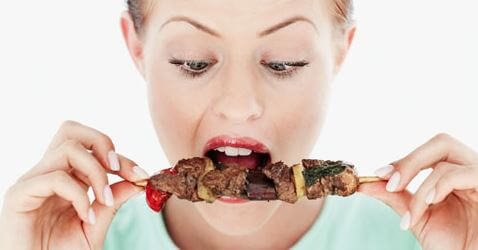An Unbalanced Diet - How it Affects Your Body

When we talk about diets, everyone thinks of the control or regulation of the quantity and types of food a person or animal eats. Generally, this is done with a specific goal in mind. Yet you shouldn’t forget that a “diet” also just means, a collection of foods that a living being will typically eat. This is why we shouldn’t eat an unbalanced diet.
Keeping these definitions in mind, we’re going to talk about how an unbalanced diet for weight loss can negatively affect you. It might even stop you from consuming what your body needs.
You should know that if you lose a lot of weight quickly, you may be more prone to certain health problems. Examples of these are, dehydration, chronic fatigue, and a higher probability of suffering injuries or eating disorders such as anorexia.
Dehydration

A rapid loss of liquids can create the false sensation of weight loss. We say “false” because, sooner or later, the water that you lost, is gained when you resume normal eating habits.
High-protein, fasting, or very low-calorie diets are the primary types that cause dehydration. You should avoid these types of unbalanced diets.
Cardiovascular and renal problems are the most significant consequences of the loss of water. After all, blood is mainly composed of water. The loss of water makes your blood thicken and causes circulation problems, otherwise known as low blood pressure. This can lead to your body having problems regulating its own temperature.
At the same time, dehydration can cause a lowered efficiency in important basic functions. This leads us to chronic fatigue. Chronic fatigue is the feeling that the body is heavy, and that we’re constantly tired. It’s another major issue created by unbalanced diets.
Chronic fatigue
An unbalanced diet excessively restricts the nutrients and the normal activities of your body. This causes your body to slow down and work with the minimum amount of effort necessary to carry out its tasks. This is because it starts to feel constantly fatigued.
Your nervous system may also be affected. Diets activate the parasympathetic nervous system. This then leads the body to try and conserve its energy. There’s no better way to do that than feeling tired.
The hypothalamus is also altered. This part of the brain is responsible for appetite, sleepiness, and emotions. That’s why if you take on an unbalanced diet, your ability to rest can be affected. You might also feel more irritable.
Injuries caused by an unbalanced diet
This section is for athletes. Extreme weight loss can bring about a loss of muscle. Muscle is the major protector of bones and joints.
If your muscles are very weak and you keep playing sports with the same intensity as before, you may soon find yourself suffering injuries.
The probability of fractures also increases when you play sports in these conditions. This is due to the fact that bones become weak due to a lack of nutrients.
Eating disorders

You should make sure that the desire to lose weight doesn’t overtake you in the form of obsessions. This could lead you to contract severe eating disorders, such as anorexia. Anorexia is an eating behavior disorder. It is characterized by abnormally low body weight, intense fear of weight gain, and a distorted perception of your own body weight.
Bulimia is another eating and psychological disorder that can be influenced by this. It is characterized by the behaviors in which the affected person adopts unhealthy eating patterns. They eat excessively in short periods of time, called “binge eating”, followed by periods of regret. The regret causes the person to try and remove the excess food, through vomiting or by using laxatives.
Advice
- Don’t weigh yourself every day.
- Don’t look in the mirror every day, looking for a perfect body.
- Consult with a specialist before beginning any diet.
- Exercise along with following your diet.
- Experts recommend that you don’t lose more than four pounds per week.
When we talk about diets, everyone thinks of the control or regulation of the quantity and types of food a person or animal eats. Generally, this is done with a specific goal in mind. Yet you shouldn’t forget that a “diet” also just means, a collection of foods that a living being will typically eat. This is why we shouldn’t eat an unbalanced diet.
Keeping these definitions in mind, we’re going to talk about how an unbalanced diet for weight loss can negatively affect you. It might even stop you from consuming what your body needs.
You should know that if you lose a lot of weight quickly, you may be more prone to certain health problems. Examples of these are, dehydration, chronic fatigue, and a higher probability of suffering injuries or eating disorders such as anorexia.
Dehydration

A rapid loss of liquids can create the false sensation of weight loss. We say “false” because, sooner or later, the water that you lost, is gained when you resume normal eating habits.
High-protein, fasting, or very low-calorie diets are the primary types that cause dehydration. You should avoid these types of unbalanced diets.
Cardiovascular and renal problems are the most significant consequences of the loss of water. After all, blood is mainly composed of water. The loss of water makes your blood thicken and causes circulation problems, otherwise known as low blood pressure. This can lead to your body having problems regulating its own temperature.
At the same time, dehydration can cause a lowered efficiency in important basic functions. This leads us to chronic fatigue. Chronic fatigue is the feeling that the body is heavy, and that we’re constantly tired. It’s another major issue created by unbalanced diets.
Chronic fatigue
An unbalanced diet excessively restricts the nutrients and the normal activities of your body. This causes your body to slow down and work with the minimum amount of effort necessary to carry out its tasks. This is because it starts to feel constantly fatigued.
Your nervous system may also be affected. Diets activate the parasympathetic nervous system. This then leads the body to try and conserve its energy. There’s no better way to do that than feeling tired.
The hypothalamus is also altered. This part of the brain is responsible for appetite, sleepiness, and emotions. That’s why if you take on an unbalanced diet, your ability to rest can be affected. You might also feel more irritable.
Injuries caused by an unbalanced diet
This section is for athletes. Extreme weight loss can bring about a loss of muscle. Muscle is the major protector of bones and joints.
If your muscles are very weak and you keep playing sports with the same intensity as before, you may soon find yourself suffering injuries.
The probability of fractures also increases when you play sports in these conditions. This is due to the fact that bones become weak due to a lack of nutrients.
Eating disorders

You should make sure that the desire to lose weight doesn’t overtake you in the form of obsessions. This could lead you to contract severe eating disorders, such as anorexia. Anorexia is an eating behavior disorder. It is characterized by abnormally low body weight, intense fear of weight gain, and a distorted perception of your own body weight.
Bulimia is another eating and psychological disorder that can be influenced by this. It is characterized by the behaviors in which the affected person adopts unhealthy eating patterns. They eat excessively in short periods of time, called “binge eating”, followed by periods of regret. The regret causes the person to try and remove the excess food, through vomiting or by using laxatives.
Advice
- Don’t weigh yourself every day.
- Don’t look in the mirror every day, looking for a perfect body.
- Consult with a specialist before beginning any diet.
- Exercise along with following your diet.
- Experts recommend that you don’t lose more than four pounds per week.
All cited sources were thoroughly reviewed by our team to ensure their quality, reliability, currency, and validity. The bibliography of this article was considered reliable and of academic or scientific accuracy.
- Dantoine, T., & Rainfray, M. (2006). Trastornos de la hidratación, alteraciones hidroelectrolíticas, insuficiencia renal aguda y alteraciones del fósforo y del calcio. EMC – Tratado de Medicina, 10(4), 1–9. https://doi.org/10.1016/s1636-5410(06)70401-9
- Lozano-Triana, Carlos Javier. (2016). Examen general de orina: una prueba útil en niños. Revista de la Facultad de Medicina , 64 (1), 137-147. https://doi.org/10.15446/revfacmed.v64n1.50634
- Morante, S., & Adali, Z. (2017). Cirrosis hepática en paciente de sexo masculino de 52 años de edad. Babahoyo: UTB, 2017.
- Ruiz Mezcua, Juan Ramón. (2002). Estudio predictivo de la osteoporosis. [Tesis] Universidad Complutense de Madrid. https://eprints.ucm.es/id/eprint/2869/
This text is provided for informational purposes only and does not replace consultation with a professional. If in doubt, consult your specialist.








